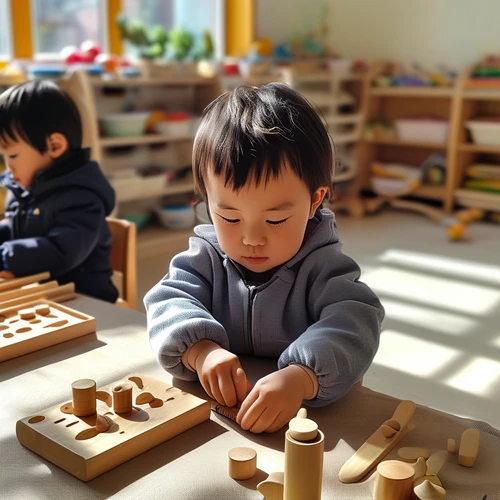Montessori education focuses on fostering independence, concentration, and joyful learning through carefully designed activities tailored to each child's unique pace and interests. These activities span several key areas of development, including Practical Life, Sensorial Exploration, Mathematics, Language, Science, and Art.
Practical Life Activities: These are cornerstones in Montessori classrooms. They often involve everyday tasks like pouring water or sweeping floors, which help children develop fine motor skills, coordination, and a sense of responsibility for their environment. By participating in Practical Life activities, children cultivate independence while learning to care for themselves and others.
Sensorial Activities: The Montessori materials designed for sensorial exploration allow children to refine their senses through hands-on experiences. For instance, children might compare objects by weight using balance scales or identify variations in texture with touch boards. These exercises heighten sensory awareness and promote cognitive development.
Mathematics: Montessori mathematics activities build a strong foundation for more complex concepts by starting with concrete materials that children can manipulate. Children progress from counting physical objects to abstract numerical symbols, gradually grasping the fundamental principles of addition, subtraction, multiplication, and division through hands-on learning.
Language Activities: Language development in Montessori education is emphasized through multi-sensory approaches. Phonetic analysis, spelling, reading, and writing are introduced with specially designed materials that engage children as they sound out words, form letters, and even build vocabulary. This method ensures a solid understanding of language components.
Science Activities: Montessori science exposes children to various biological and physical concepts through observation and hands-on experimentation. Children might study the life cycle of a butterfly or learn about states of matter using interactive learning materials, reinforcing ideas in a fun and engaging way that sparks curiosity.
Art Activities: Creativity flourishes as children engage in open-ended art projects. Montessori art activities allow children to explore colors, textures, and techniques through painting, drawing, or sculpting, fostering self-expression while refining their motor skills.
By immersing children in these carefully structured yet flexible activities, Montessori education aims to nurture self-motivated learners who thrive on independence and a love for learning.

